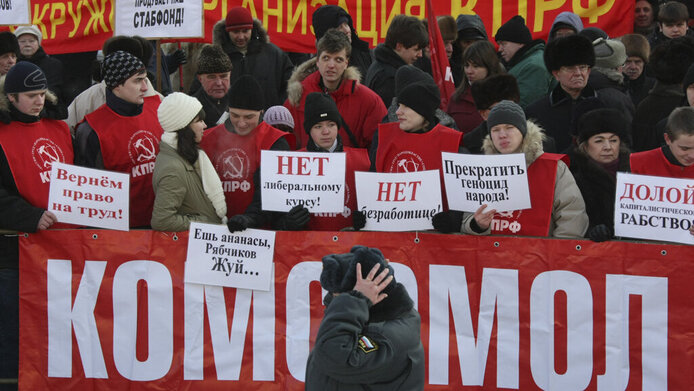An unconfronted past: Russia and the Soviet Era

The past is the future – at least as far as a society's political culture is concerned. Just what such a future looks like depends significantly on how that society confronts its own past. In the context of a project sponsored by the Austrian Science Fund FWF, Anna Schor-Tschudnowskaja is now analysing the extent to which such reflection is taking place among the Russian citizens with regard to the Soviet era.
Patterns of the past
The aim of the project is to identify the collective patterns of interpretation among the Russian population that form the basis for dealing with the Soviet experience. Speaking about the project's importance, the Sigmund Freud University Vienna staff member says: "Even almost 25 years after the collapse of the Soviet Union, there is still an incredible dynamic in the social change in Russia. In fact, there was never a clear break from the political culture of the Soviet era, and society's approach to this is inconsistent and fraught with tension – and little has been done in the way of analysing it." For instance, the collective memory of the Russian people seems to still be dominated by a few "heroic" achievements of the Soviet era: industrialisation in the 1930s, the World War II victory, and the long-held leadership position in the conquest of outer space. Other aspects, in contrast, such as state crimes and authoritarian exercise of power, are ignored or downplayed. For Schor-Tschudnowskaja, this selective perception is a core component of the current political culture in Russia – and a significant influencing factor for its future development. Now, in this three-year project, the experienced expert on Russia will focus on systematically analysing this process of coming to terms with the past.
Direct contact
Some 30 to 40 biographical interviews will serve as the basis of her analysis. To increase the meaningfulness of the results, the interviews will be conducted in two different age groups and cities. They will therefore target both young people between the ages of 20 and 25 and people over 60 in Moscow and St. Petersburg. Some of the interviews will be structured and some will have an open format. In Schor-Tschudnowskaja's words: "The structuring is important in achieving meaningful evaluation results. The open format, on the other hand, allows us to address individual aspects – and thus to obtain a true everyday perspective." The latter is particularly important because it is considered to be a scientifically accepted fact that the individual life experience and the interpretation thereof are the first steps in giving the political culture its substance. In the subsequent analysis, the focus will be on whether and how these people referred and refer to the meaning of their experiences with the Soviet Union. Furthermore, the focus will be on searching for patterns in the perception and interpretation of what happened back then – and of the context in which it occurred. In another part of the FWF-project, Schor-Tschudnowskaja wants to review the scientific literature to find indications of special patterns of interpretation here, too. In this way, together with the empirical findings from the interviews, she will identify patterns and be able to assess their significance for future societal development. The project findings are not merely of scientific interest. They will allow representatives from politics and business a new and more differentiated view of the post-Soviet society in present-day Russia – a perspective that can be of great importance, particularly in times of high economic and political tension.
Personal details Anna Schor-Tschudnowskaja works as a scientific assistant at the Department of Psychology at Sigmund Freud University Vienna. She has studied Psychology, Political Sciences and Sociology.





